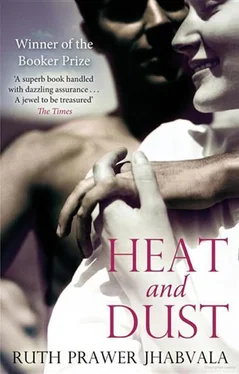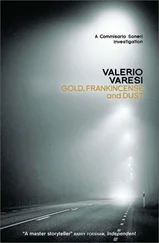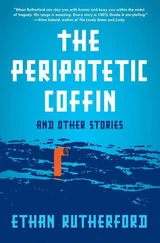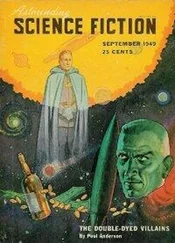I sat with them under the tree. There had been a particularly severe dust storm earlier in the day and, as sometimes happens, it had cleared the air, so that now, for the remaining hour of daylight, everything was luminous. The water in the reservoir was pure as the sky, disturbed only by the reflections of skimming kingfishers or of trees momentarily nodding their leaves into its surface. At the far end some buffaloes were bathing, immersed so deeply that only their heads were visible above the water. There were a lot of skinny, lively monkeys skipping about on the bank, in and out and over the suttee stones.
"You see," said Maji, "I knew she would come here." She continued to stroke the old woman's face, not only with tenderness but with a sort of pride too; yes really as if she were proud of her for having done something special. She began to tell me about the old woman's life: how she had been left a widow and had been driven out of her father-in-law's house. Next her parents and brother had died in a smallpox epidemic, leaving her homeless and destitute. Then what could she do, Maji said: having been literally thrown on to the world to beg a living from it. At that time she had stayed not in one place but had gone all over, mostly from one pilgrim spot to the other because those were the most rewarding for beggars. About ten years ago she had come to the town and fallen sick here. She recovered but was never again strong enough to move on, so she had just stayed.
“But now she is tired," said Maji. "Now it is time. Now she has done enough." And again she stroked her face and again with pride as if the old woman had acquitted herself well.
It was pleasant sitting here — cool by the water — and we were ready to stay many hours. But she did not keep us waiting long.' As the glow faded and sky and air and water turned pale silver and the birds fell asleep in the dark trees and now only soundless bats flitted black across the silver sky: at that lovely hour she died. I would not have noticed, for she had not moved for a long time. There was no death rattle or convulsion. It was as if everything had already been squeezed out of her and there was nothing left for her to do except pass over. Maji was very pleased: she said Leelavati had done well and had been rewarded with a good, a blessed end.
1923
One day Olivia told Douglas that Harry was lying ill at Khatm and that she wanted to go and visit him. Douglas said "Oh?" and nothing further. She took this as the permission she wanted: from now on, she decided, Douglas knew that she went to Khatm, she had told him, he was apprised of the facts. There would be no need in future to hurry back lest he arrive at home before her. If he did, she could simply and truthfully tell him that she had been to visit sick Harry at Khatm. But he never did arrive before her; somehow he seemed to be kept at the office later and later, and when he came home he was so tired that he went to sleep very soon.
Olivia stayed up much later, sitting by the window to catch some cool air. She was usually still asleep when he left in the morning; he always left very early so as to be able to ride out on inspection before the sun got too hot.
However, one morning she was awake. She came and sat with him in their breakfast room (now the post office); this was something she had not done for some time. She watched him eat ham and sausages. It struck her that his face had become heavier, even somewhat puffy, making him look more like other Englishmen in India. She pushed that thought aside: it was unbearable.
"Douglas," she said, "Harry doesn't seem to be getting any better."
"Oh?" He had cut up his food into small pieces and was chewing it slowly, stolidly.
"I was wondering whether we shouldn't ask Dr. Saunders to have a look at him."
"Dr. Saunders doesn't take private patients."
"But he's the only English doctor around here." When Douglas did not react, she added" And Harry is English. "
Douglas had finished his breakfast and now lit his morning pipe (he smoked a pipe almost constantly now). He puffed at it as slowly and stolidly as he had eaten. She had always loved him for these qualities — for his imperturbability, his English solidness and strength; his manliness. But now suddenly she thought: what manliness? He can't even get me pregnant.
She cried" Must you smoke that dashed pipe? In this heat?" He stayed calm, knocking ash into an ashtray — carefully, so as not to spill any on the tablecloth. At last he said "You should have gone to Simla."
"And do what? Take walks with Mrs. Crawford? Go to the same old boring old dinner parties — oh oh," she said, burying her face in despair, "one more of those and I'll lie down and die. "
Douglas failed to respond to this outburst. He went on smoking. It was very quiet in the room. The servants, clearing the breakfast dishes, were also as quiet as could be so as not to disturb the Sahib and Memsahib having a quarrel in English.
After a while Olivia said in a contrite voice" I don't know what's wrong with me."
"I told you: it'll the heat. No English woman is meant to stand it."
"You're probably right." She murmured: "As a matter of fact, darling, I'd like to consult Dr. Saunders myself."
He looked at her. His face may have changed, but his eyes had remained as clean and clear as ever.
"Because I'm not — " she looked down shyly, then back into his eyes, "getting pregnant. "
He left his pipe in the ashtray (a servant solicitously knocked it out), then got up and went into 'their bedroom. She followed him. They clung to each other; she whispered "I don't want anything to change… I don't want you to change."
" I 'm not, " he said.
"No you're not." But she clung to him tighter. She longed to be pregnant; everything would be all right then — he would not change, she would not change, they would be as planned.
"Wait a while, "he said. "It'll be all right. "
"You think?"
"I'm sure."
She leaned on his strong arm and went out with him to the front of the house. Although it was still so early in the morning, the air was stale.
"I wish you'd gone to Simla, " he said.
"Away from you?"
"It's so bad for you here. This awful climate. "
"But I feel fine!" She laughed-because she really did.
He pressed her arm in gratitude: "If I can get away we'll both go."
"You think you can?… Oh you don't have to for me," she said. "I'm quite all right — I don't mind it — really I don't. I'm fine, "she said again.
He exclaimed at her fortitude. He wanted to linger, but his syce stood holding his horse, his peon carried his files, his bearer stood waiting with his solar topee.
"Don't come out," Douglas said, but she did. She looked up at him as he sat in the saddle and he looked down at her. That morning it was difficult for him to leave.
He said "I'll have a word with Dr. Saunders about Harry."
She waved to him for as long as she could still see him. A servant held the door open for her to go back into the house, but she stayed looking out a bit longer. Not in the direction in which Douglas had left, but the other way; towards Khatm, towards the Palace. It did not make any difference as everything was under the same pall of dust. But it was true what she had told Douglas: she felt fine — entirely untroubled by the heat or the murky atmosphere. It was as if there were a little spring welling up inside her that kept her fresh and gay.
Later that morning — she looked at her wrist watch, there was still time before the Nawab's car was to come for her she walked across to the Saunders' house. But Dr. Saunders had already left for the hospital and there was only Mrs. Saunders. Olivia was surprised to find her out of bed. She was sitting in one of the cavernous rooms staring into an empty fireplace. She told Olivia "It’s not good to let them see you in bed… the servants” she explained lowering her voice and with a look towards the door. "I want to be in bed. It’s where I ought to he. But you don’t know what goes on in their heads.”
Читать дальше












